The academic seminar “Prosperous Vietnam in the New Era” is organized to create a forum for academic and policy exchanges, connecting experts, researchers, policy makers and businesses to learn and discuss new economic models, structural reforms and innovation-based growth strategies, aiming to bring Vietnam towards sustainable and inclusive prosperity in the new era.
Notably, the event was held during the State visit to Vietnam by General Secretary and President of China Xi Jinping. This is an important milestone, marking the strong cooperation between Vietnam and China in the fields of education and scientific research, especially in the context that this year is the "Vietnam - China Humanitarian Exchange Year".
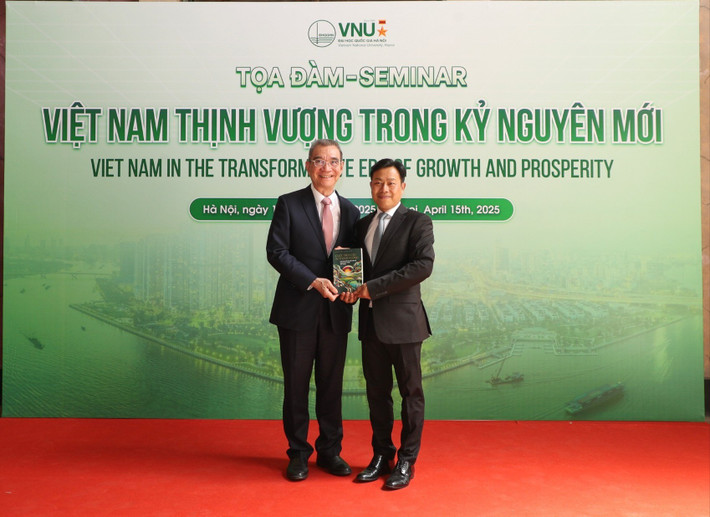
How to escape the income trap and realize the desire for prosperity?
Prof. Lam Nghi Phu is one of the world's leading economists. As a former Chief Economist and Senior Vice President for Development Economics of the World Bank, he has made great contributions to promoting sustainable economic development globally. At the Symposium, he shared a speech on "Vietnam's Prosperity in the New Era: Perspectives from New Structural Economics".
From the perspective of research on new structural economics, along with many years of experience and practice as chief economist of the World Bank, Professor Lam Nghi Phu always believes that the pursuit of prosperity, although difficult, is always equally shared among countries, especially developing economies.
The essence of modern income growth is a process of continuous structural transformation in technology and occupations, aimed at raising labor productivity, along with improvements in soft and hard infrastructure in the economy, aimed at reducing transaction costs. Developing countries have the advantage of being latecomers in technological innovation, industrial upgrading and institutional reform, which gives them the potential to grow faster than developed countries. However, most developing countries remain stuck in low- or middle-income status. He said that both the low-income trap and the middle-income trap are the result of a failure to make dynamic structural transformation, which prevents developing countries from growing faster than high-income countries.
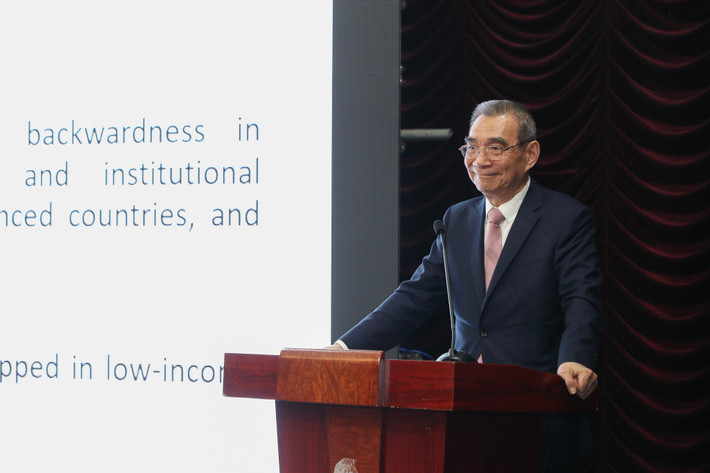
How to escape this trap and realize the aspiration of prosperity? The answer lies in the fact that policymakers must have a thorough understanding of the factors that drive national development and identify potential comparative advantages. That also means understanding a country’s resource structure and how it changes over time and creating conditions that foster the development of new industries that match its potential comparative advantages is the key to prosperity.
Professor Lam Nghi Phu cited the history of the development of the world's economic growth theory and practice, generalizing the major lines of the growth model - the decisive mechanism relationship "state - market", or the growth structure based on "import substitution" or "export orientation", in the interpretations of the "classical", "Keynesian", "Neoclassical" or "Old structure" - "New structure" schools, ... based on the practice of developing countries to make comments and suggestions at a commensurate level.
Combining theory and practice, Prof. Lam Nghi Phu raised the role of appropriate infrastructure and government participation in improving the economic environment. He said that countries should follow their comparative advantages to compete globally and upgrade their industries. He also proposed a 6-step economic transformation process to promote new industries and sustainable growth, including: Identifying industries with growth potential through international comparisons; Assessing the ability to realize the industry, removing barriers for domestic enterprises; Seeking foreign direct investment (FDI) or organizing new business incubation programs; Government interest and support for private enterprises to expand their scale and implement initiatives; Using special economic zones or industrial parks in countries with weak infrastructure and unfavorable business environments; Government support policies for pioneering enterprises through tax incentives, loans, and access to foreign currency.
Professor Lam Nghi Phu believes that a facilitating state with a strategic coordinating role, using industrial policy flexibly and with clear goals, is the key for Vietnam and other middle-income countries to escape stagnation and rise to the group of high-income countries. If the Government plays the right supporting role in an efficient market, helping to transform potential comparative advantages into reality, then Vietnam can absolutely grow dynamically, even faster than developed countries.
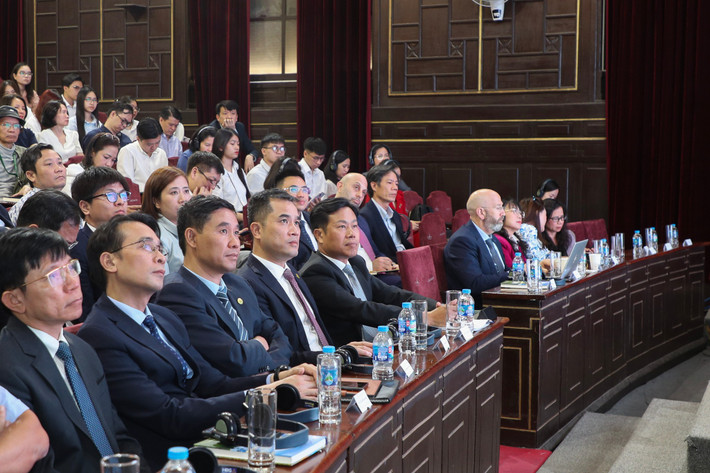
Solutions to support the private sector economy…
At the discussion session, experts, researchers, and policy makers studied and discussed enhancing the development of science, technology, innovation, new economic models, and solutions to support the private sector economy...
Professor Lam Nghi Phu believes that in a developing economy, new technologies and innovation are needed to maintain momentum for development as well as increase productivity. From his personal perspective and experience, the Professor shares that in the process of applying technology to manufacturing industries, for industries that are not yet self-sufficient in technology, it is necessary to import technology from developed countries.
Dr. Le Duy Binh, Director of Economica Vietnam, shared that among 940,000 operating enterprises in Vietnam, the proportion of medium-sized enterprises is equivalent to that of large enterprises, only 1.5%. The remaining 97% are small and micro-sized.
He analyzed that the size of the enterprise also affects investment in technological innovation, management, research and development. In addition, from within the enterprise, their management methods are still fragmented and small-scale, focusing on pre-existing advantages such as resources or cheap labor. In particular, the micro-enterprise sector mainly focuses on ensuring livelihoods and does not have great ambitions.
Sharing about this content, Prof. Lam Nghi Phu said that the Chinese Government pays great attention and provides great support to the small and medium-sized enterprises. Specifically, it allows these enterprises to participate in economic activities along with loan support. The government's support is always guaranteed to be stable and continuous.
Dr. Vu Hoang Linh, University of Economics, VNU, said that the foreign direct investment (FDI) sector is increasingly asserting its important role in Vietnam's socio-economic development. He believes that the economic transformation process mentioned by Prof. Lam Nghi Phu can be applied to promote new industries and seek foreign investment.
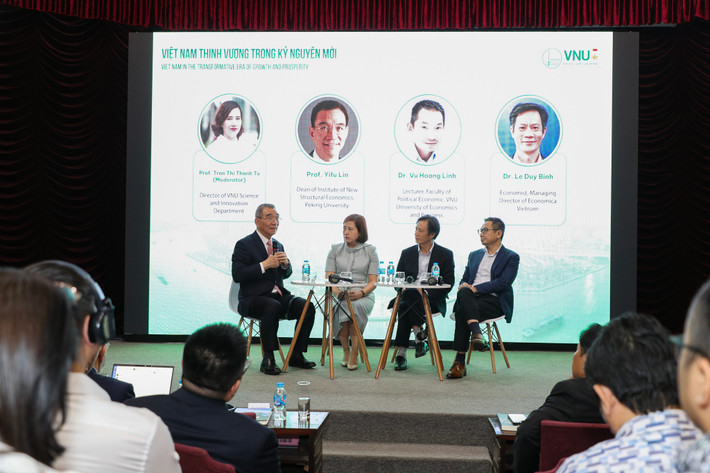
Regarding the role of universities in economic development, Prof. Lam Nghi Phu shared that it is necessary to strengthen cooperation between universities and businesses. Forms of cooperation between universities and businesses often focus on the field of training and transferring human resources to businesses. Through cooperation, educational institutions will adjust their curriculum and subjects to meet the actual needs of the labor market. At the same time, he also recommended that lecturers and students at universities should proactively conduct research on social needs and business needs to make reasonable proposals for changes to the curriculum.
During the discussion, experts also said that it is necessary to consider the private sector as the key to growth, so it is necessary to prioritize policies for developing private enterprises. In the coming time, developing the private economic sector in Vietnam should be considered one of the key driving forces for economic growth and innovation. This sector not only contributes greatly to GDP, creating jobs for tens of millions of workers, but also has the potential to enhance national competitiveness if it is given the right conditions to develop. To do that, the State needs to continue to improve the business environment, ensuring healthy, transparent and equal competition among economic sectors.
Speaking at the seminar, VNU Vice President Pham Bao Son shared that with the mission of being the leading training and scientific research center in Vietnam, VNU is constantly striving to develop high-quality human resources and provide effective policy advice. VNU is proud to contribute to the implementation of major policies and resolutions of the Party and Government, especially Resolution 45 on developing intellectuals, Resolution 57 on Science and Technology, Innovation and National Digital Transformation as well as preparing for the new resolution on the Private Economy.
VNU has signed and implemented cooperation with dozens of leading educational institutions in China such as: Peking University, Tsinghua University, Nanjing University, Xiamen University, Macau University, etc. This cooperation not only helps promote experience sharing in education, scientific research and innovation but also contributes to enhancing the educational and scientific-technological cooperation between the two countries in the digital intelligence era.
In the context of the world economy facing many uncertainties and the international trade order having many fluctuations, we realize more clearly the important role of international cooperation and sustainable development. These fluctuations require us to have flexible and creative strategies to overcome challenges and seize opportunities. VNU leaders believe that, with the participation of leading experts, today's Dialogue will bring new perspectives and practical solutions to promote Vietnam's prosperity in the new era.
Source: https://daibieunhandan.vn/professor-dai-hoc-bac-kinh-chia-se-goc-nhin-kinh-te-voi-chu-de-viet-nam-thien-vuong-trong-ky-nguyen-moi-post410380.html


![[Photo] "Lovely" moments on the 30/4 holiday](https://vphoto.vietnam.vn/thumb/1200x675/vietnam/resource/IMAGE/2025/5/1/26d5d698f36b498287397db9e2f9d16c)

![[Photo] Binh Thuan organizes many special festivals on the occasion of April 30 and May 1](https://vphoto.vietnam.vn/thumb/1200x675/vietnam/resource/IMAGE/2025/5/1/5180af1d979642468ef6a3a9755d8d51)


![[Photo] Ha Giang: Many key projects under construction during the holiday season](https://vphoto.vietnam.vn/thumb/1200x675/vietnam/resource/IMAGE/2025/5/1/8b8d87a9bd9b4d279bf5c1f71c030dec)
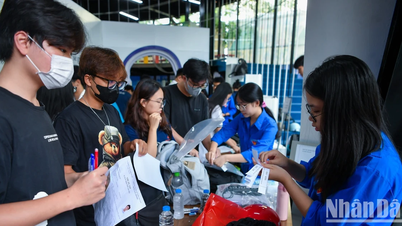











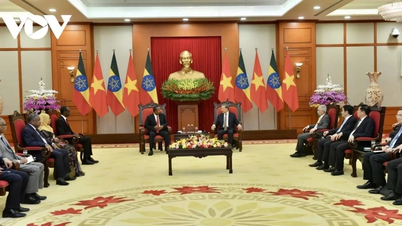
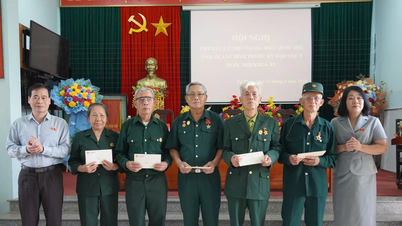
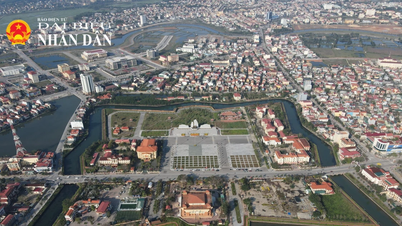
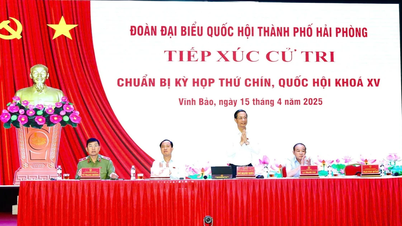




















































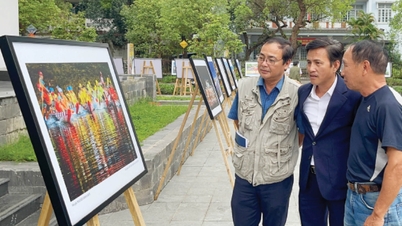

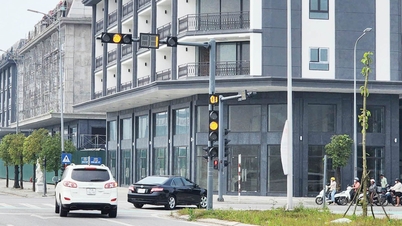














Comment (0)